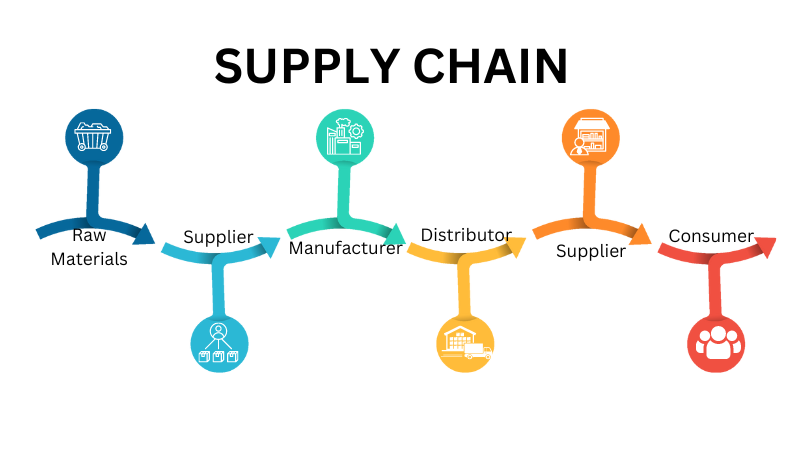
In an era dominated by digital transformation, supply chain management emerges as a key frontier for innovation and efficiency. The smooth operation of the supply chain is crucial for businesses to deliver their products. But this intricate network is often affected by customer demands, operational difficulties and disruptions. Hence companies are turning to AI for supply chain automation operations to meet the increased demand and the need for greater efficiency.
Artificial Intelligence offers a wide range of tools and solutions, including forecasting demand with unparalleled accuracy, mitigating risks, streamlining logistics, and automating tasks to deliver superior value products to customers. This enables businesses to stay competitive in the ever-changing global market. In this blog we delve further into the profound influence of Generative AI in supply chain operations.
A supply chain refers to the network of interconnected entities such as individuals, organizations, resources, activities and technologies involved in the production and distribution of services from the procurement stage to the consumer end.

Supply chain management involves coordinating and optimizing these activities to ensure the smooth flow of goods or services, minimize costs, maximize efficiency, and meet customer demands. The primary goal of supply chain management is to enhance responsiveness, competitiveness and sustainability while minimizing cost and maximizing profitability throughout the supply chain.
Related : What is Phi3 Mini and what are its benefits in application development?
Today’s supply chains are increasingly globalized, with materials sourced from one region, manufacturing facilities in another region and finished services reaching customers across the globe. This complicated arrangement poses challenges in communication, regulatory compliance and managing transporting logistics.
Businesses encounter a perpetual struggle in maintaining pace with the fluctuating buying habits of consumers, making it difficult to forecast the demand and maintain inventory levels efficiently. As a result, they face financial risks incurring losses due to stockouts or overstocking.
The occurrence of unforeseen events like natural disasters, political unrest or pandemics can disrupt the smooth flow of supply chains leading to delay and shortage of goods.
Related : Generative AI vs Predictive AI
As the cost of raw materials, transportation and labor continue to rise , businesses face significant pressure to sustain profitability while staying competitive on pricing.
Challenges in sourcing skilled labor in various sectors of the supply chain, such as manufacturing and transportation can lead to bottlenecks and slow down operations.
It can be difficult to track the movement of goods in real time in the intricate web of supply chains. This limited visibility poses challenges in swiftly identifying and rectifying problems.
The increasing expectations of customers for eco-friendly practices across the supply chains are driving businesses to explore sustainable sourcing strategies and minimize their environmental footprint.
Related: To know how Zoondia utilizes blockchain technology to revolutionize workflow automation.
By harnessing the capabilities of generative AI algorithms, businesses can achieve unparalleled accuracy in demand forecasting and planning. Custom-built AI solutions analyze vast volumes of historical data, market trends, and external factors to generate precise demand forecasts, enabling businesses to optimize inventory levels, minimize stockouts, and enhance overall supply chain efficiency.
AI algorithms can detect anomalies, identify potential issues by monitoring real-time data from sensors and machinery and suggest preemptive measures, thereby minimizing downtime, reducing maintenance costs, and optimizing asset utilization for enhanced operation efficiency.
Generative AI enables the optimization of supply chain processes by analyzing complex networks, identifying bottlenecks, and recommending optimal routes and distribution strategies. Hence businesses can streamline operations, reduce lead times, and enhance overall agility and responsiveness.
Related : Top AI and Machine Learning Trends : Insights for Businesses
Elevating risk management to unprecedented levels, Generative AI conducts thorough analyses of potential disruptions, identifies vulnerabilities meticulously, and devises proactive mitigation strategies. The result is seamless business continuity and unwavering resilience in the face of uncertainties.
From predictive modeling to generative design, technology empowers businesses to push the boundaries of innovation and create products that are smarter, more efficient, and more impactful.By capitalizing on AI-generated designs, businesses expedite the product development cycle, trim time-to-market, and foster innovative solutions that better align with customer needs and preferences.
Generative AI algorithms possess the capability to optimize operations, ultimately curbing environmental impact and nurturing sustainability. As a result, they serve as a cornerstone in fostering an eco-friendly and sustainable supply chain ecosystem.
Related : AI-driven Automation: Transforming DevOps Practices
At Zoondia, leading app development & software solutions company, we are dedicated to harnessing the transformative potential of generative AI to drive innovation, streamline operations and promote sustainable practices across the supply chain. Through our custom software development expertise we empower businesses to surmount challenges,capitalize on opportunities and thrive in today’s rapidly evolving marketplace.
Reach out today to discover how we can assist your business in harnessing generative AI to revolutionize the supply chain operations and attain enduring success.
Leave a Reply